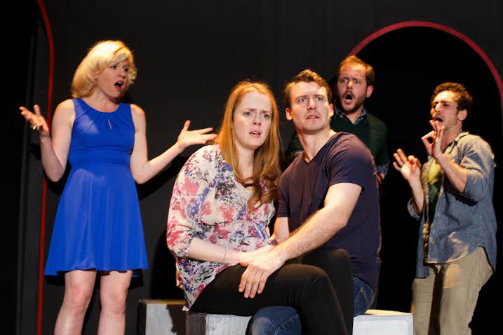Men and Women Talking Love and Sex
Written and Directed by John Paul Porter
Produced by Porter's Playhouse
Off Broadway, New Play
Extended through 2.14.15
Davenport Theater, 354 West 45th Street
by Adrienne Urbanski on 12.18.14
 Karen Stanion, Aaron Ballard, Ben Kahre, Zane Johnston, and Nicolas Greco in Men and Women Talking Love and Sex.
Karen Stanion, Aaron Ballard, Ben Kahre, Zane Johnston, and Nicolas Greco in Men and Women Talking Love and Sex.
BOTTOM LINE: This play explores the ingredients that lead to a doomed marriage, sometimes offering insightful and comedic observations on the pitfalls of dating and relationships.
Despite its title, there is a surprisingly minimal amount of sex and discussion of sex in John Paul Porter’s new play Men and Women Talking Love and Sex, (which sounds like the title to a collection of Raymond Chandler stories) at least in comparison to the numerous New York theater productions I’ve seen where no holds are barred when it comes to their detailed discussion of joyful copulation. Rather, this production skips over the happier, early moments of being in a relationship and instead gives more focus to the dreary routine of a married couple who perhaps were never quite the best match for one another.
The play opens with Caylor (Ben Kahre) drunkenly moaning on the floor of a bar while his two friends Pete (Zane Johnston) and Tom (Nicolas Greco) credit his pain to heartbreak and wonder how many drinks they can put on his tab. The play then goes back in time to show us just how Caylor wound up in such a state. Caylor and Annie (Aaron Ballard) meet one in day in a library when Caylor is hunting for a lost contact lens. Despite the fact that Caylor is unable to clearly see Annie he compliments her on her nice legs and tries to guess just what the woman he is flirting with looks like. Once the contact is found, Caylor finds that Annie is nothing like the sort of woman he usually dates: she is tall and fair while his preferred type is short and dark. Nonetheless, Caylor has to admit that there is some chemistry between the two of them and after some hesitation on both of their parts the two begin dating.
Peppering the story of Caylor and Annie’s relationship are commentary from their friends Pete, Tom, and Clarinda (Karen Stanion). The trio offers commentary on the events that unfold between the couple, and on the differences between the sexes when it comes to dating. Pete offers the humorous observation that he only got married because he was tired of having to tell his life story over and over again to new people and he figured that if he got married he would only need to tell it to one more person. Tom, who is a caricature of every sex-obsessed man, spars with independent-minded Clarinda who clarifies some of his dense thinking towards women. She also tries to be a voice of strength for Annie, who can’t muster to find the courage to tell Caylor that she does not enjoy sleeping with him. (Love and sex do not seem to be especially enjoyable pastimes in this play. The occasions upon which Caylor and Annie are intimate at least one party is always unhappy.)
However, very early on in the play the relationship takes a sharp turn when Annie brings Caylor the sobering news that she is pregnant, and it’s evident that she does not want to terminate it. As neither of them is quite sure about each other yet, they plan a sort of “bohemian” arrangement where they will have separate apartments but raise the baby together. That quickly turns into them living together and Caylor acquiesces and asks Annie to marry him despite his earlier protestations that he did not want to get married. Once their son is born things quickly go south for the two love birds with Annie viewing the sex that they do have as a monotonous chore. Caylor abandons his part time teaching job and takes on an office job to better provide for his family, but becomes increasingly depressed as he realizes that he will never make any money with his writing. Annie meanwhile is increasingly unhappy with both her domestic and professional life and she plans on going back to school to become a librarian. Finally, the two find themselves locked into depressing and unfulfilling lives.
Overall, Porter (who both wrote and directed the play) shows talent as his dialogue is both witty and sometimes insightful, and the more comedic moments in the play are perfectly timed and delivered to maximize the effect of each line. While Porter’s generalities about the female perspective on heterosexual sex are not always accurate, his female characters bear far more authenticity than other male playwrights who put women up on a pedestal of innocence or keep them as completely undeveloped arm candy. Stanion, Johnston, and Greco work well together as a comedic trio, especially when they lampoon the academic administration at Caylor’s college who just will not give him tenure. Ballard and Kahre are also believable and likable as a doomed couple, convincingly showing their characters’ vulnerabilities.
Despite the relevant subject matter, this show is probably one you would not want to take a date to (unless perhaps you want to show why you need to breakup). Rather, this is the sort of sobering show that might help you nurse your own post-breakup wounds as you ask yourself just what went wrong in your last failed relationship.
(Men and Women Talking Love and Sex plays at Davenport Theater, 354 West 45th Street, through February 14, 2015. Remaining performances are Friday at 8PM and Saturday at 8PM. Tickets are $30 and are available at telecharge.com or by calling 212.239.6200.)

